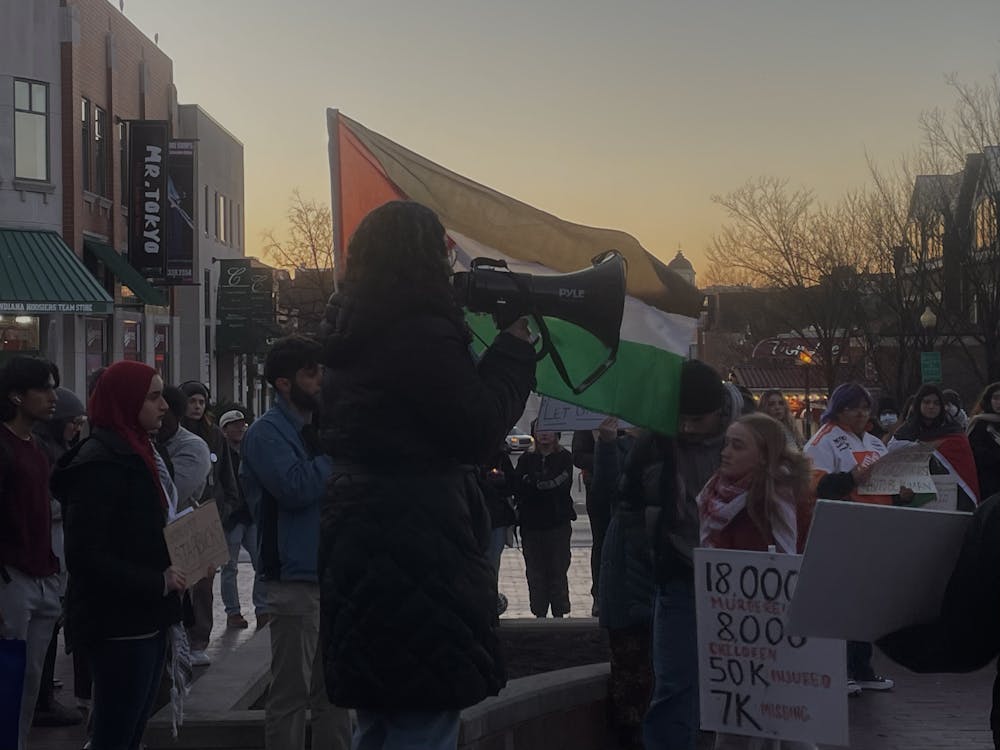As the sun set over Sample Gates, over 100 people gathered Dec. 11 to remember Palestinians who have been killed in the ongoing Israeli-Hamas war and demand action from IU and the U.S. The crowd, some holding small candles, protest signs and Palestinian flags, stayed silent as speaker after speaker read Palestinian poetry, led chants of “free, free Palestine!” and advocated for a ceasefire in the conflict.
Migratory birds flying south, cars honking in support and an officer inside an unmarked police car watched the event. IU’s Palestine Solidarity Committee led the vigil as part of a global strike day for Palestine.
The vigil began at 5 p.m. and ended around 6 p.m., but many stayed afterward to talk amongst themselves about the war.
One student, who requested anonymity because of the harassment and doxxing other pro-Palestinian college students have faced, said they were there to continue their family’s tradition of fighting for justice.
They said their family were Jewish refugees from Ukraine, who fled the region’s pogroms, anti-Jewish riots, in the early 20th century. They said they came to the U.S., taking what they learned from their own oppression and using it to fight for all others who are persecuted.
“It's really inspiring to see a lot of people from different backgrounds and cultures here,” they said. “There's people of Jewish background, Middle Eastern background, Hispanic background, white people, all different backgrounds who are coming here to fight for justice, liberty and a ceasefire.”
Serena, an IU student who requested to not include their last name due to concern for her family’s safety, said she was there to fight for her family, who are Palestinian and some of whom live in the West Bank, and raise awareness about their people.
“It hurts to see the amount of people on this campus who don’t care,” Serena said. “So, I will continue to show up and continue to speak and do what I can to educate people at this university.”
She said she wants to see an immediate ceasefire and wants IU and IU President Pamela Whitten to recognize Palestinian suffering.
Whitten came under criticism by many students and faculty after a second statement on the war condemned Hamas and expressed empathy for Jewish students and faculty but made no mention of Palestinians on campus. “Pam open your eyes,” one sign at the vigil read.
This attitude, Serena said, taken by many in the U.S., impacts Palestinian people deeply, she said. She described a shift in her parents’ attitudes while speaking to people because they fear being targeted, acting more carefully around their heritage.
Other signs included information on the war’s toll in Gaza.
“18,000 murdered. 8,000 children. 50k injured. 7k missing,” one sign read.
As of Dec. 11, over 17,000 Palestinians have been killed and around 90% of the Gaza strip’s population have been forced away from their homes after Hamas' Oct. 7 attack which killed around 1,200 Israelis, according to the Associated Press. Recently, Israeli military operations have expanded rapidly into south Gaza after a week-long ceasefire for the exchange of Israeli hostages for Palestinian prisoners ended Dec. 1.
The U.S. vetoed a widely backed United Nations resolution calling for an immediate humanitarian ceasefire Dec. 8.
Bryce Greene, a member of the Palestine Solidarity Committee, said he was there to oppose America’s role in supporting Israel in the conflict.
“I want the U.S. to adhere to international law and call for a ceasefire, and I want them to cease giving Israel weapons, military, economic and political support,” he said.
Speakers over their megaphone shared their stories, starting by reciting a poem by Anees Mokhiber with the repeating line, “if only you knew a Palestinian.” One speaker who knew people who survived the bombing of the Gaza Strip’s north under evacuation order described their friends’ difficulty in finding food, often eating one meal per day.
Another speaker, who is Palestinian, described his experience growing up in a dual-faith household with a Muslim father and a Catholic mother. His family on his mother’s side, he said, will not be celebrating Christmas this year out of solidarity with the people in Gaza.
“800 Christians exist in Gaza, but somehow, they’re not Christian enough to warrant sympathy from around the world,” he said.
Recently, he said he was named godfather of his Palestinian niece, who also has a Catholic mother and a Muslim father.
“Through her, I see innocence and hope and humanity,” he said. “And I think to myself, what would happen if we were to lose her? What would happen if she didn’t get the chance to grow up?”
After the event concluded, people stayed to talk and gathered their signs and candles to one side. Hanah Yuisa Vargas, who said she has heritage from the indigenous Taíno people from the Caribbean islands, beat smoke from burning white sage with a smudge feather fan onto willing people, herself and finally onto the vigil site itself.
She said the Taíno people were the first to meet Christopher Columbus when he landed in the Americas and were almost immediately subjugated by him and the Spanish Empire. She said white sage is used for cleansing people only in serious situations and ceremonies, and she used it at the vigil to show the importance of the issue and their solidarity.
“I'm bringing this out here for Palestinians to show that for our grief, we are all together,” she said.



